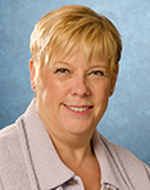Page Content
|
“We must open the doors and we must see to it they remain open, so that others can pass through.”
— Rosemary Brown
|
 I was lucky enough to hear Rosemary Brown speak in 1987. Her comments resonated with me then and have had a profound impact on my beliefs regarding feminism.
I was lucky enough to hear Rosemary Brown speak in 1987. Her comments resonated with me then and have had a profound impact on my beliefs regarding feminism.
Brown had the distinction of being Canada’s first black female member of a provincial legislature (B.C.) and the first woman to run for leadership of a federal political party. I think of her words often as I defend my belief that we need to take thoughtful and deliberate action to increase the number of women in leadership positions.
This is a belief that has its detractors. There is an assumption that women are on equal footing with men. After all, the argument goes, women are paid the same as men, women have the same opportunities as men, and therefore we do not need to focus on women in leadership. In fact, other women have often told me that they don’t want or need “special treatment,” that they have worked hard to take gender out of the equation so they can simply be recognized for their skills and talents.
But this assumes that our society is completely fair and that decisions regarding leadership are made strictly on merit. And it also ignores the reality of systemic bias.
More than 25 years ago, social psychologist Faye Crosby recognized a phenomenon called “the denial of personal disadvantage.” She found that most women are unaware of having personally been victims of gender discrimination (and deny it even when faced with objective evidence) while recognizing that women in general experience it.
Intentional acts of bias against women are referred to as first-generation gender discrimination, which isn’t nearly as common as it once was. Women in today’s workforce are much more likely to experience second-generation bias, which doesn’t intentionally exclude or produce direct, immediate harm to any individual. Rather, it creates a context in which women fail to thrive or reach their full potential.
Researchers at the Center for Gender in Organizations define second-generation gender biases as “work cultures and practices that appear neutral and natural on their face;” however, below the surface is a disconnect between formal equality and real equality. Formal equality is about equal opportunities to participate and make the choices that affect your life; real equality is about equal distribution of participation, resources, power and responsibilities.
Without an understanding of second-generation bias, we are left with stereotypes to explain why women as a group have not achieved parity with men. If women are not in leadership positions, it is because they “don’t ask,” are “too nice,” or simply “opt out.” These messages tell women who have managed to succeed that they are exceptions and women who have experienced setbacks that it is their own fault for failing to be sufficiently aggressive or committed.
But isn’t education different, since females dominate the teaching profession? Not really. While 74 per cent of Alberta teachers are female, the same can be said of only 41 per cent of principals, 44 per cent of assistant and/or deputy superintendents and only 11 per cent of superintendents. Within our own Association, 47 per cent of our elected Provincial Executive Council and 40 per cent of local presidents are women.
In 2016, in an attempt to address this issue head on, organizers of the ATA’s annual summit on educational leadership (uLead) initiated a Women in Leadership pre-conference. The idea was to create a safe space for participants to share their leadership experiences and reflect on the barriers facing women in education.
The response was overwhelmingly positive, so for uLead17 we planned another Women in Leadership pre-conference (with an expanded focus) and added a keynote panel of recognized educational leaders to discuss the challenges of persisting inequities and the possibilities for future improvement.
We then asked ourselves, how do we engage in discussions about gender equity with those who could not attend uLead?
We recognized that there is growing interest across Canada and internationally in supporting gender equity, including the growing #WomenEd and #HeforShe movements on social media, so at uLead17 we were excited to launch @WomenEdCanada.
This social media campaign, which also uses the hashtag #WomenEd, is a grassroots gender equality movement that launched in the United Kingdom in April 2015. The community has spent two years growing a network of 10,000 women in education who are currently leading or who aspire to lead.
This movement is expanding rapidly around the globe, and we invite anyone who is interested in equity to connect through Twitter, Yammer and StaffRm (a global blogging community).
With your voice added to the growing chorus, we will open doors and make sure they remain open for others to pass through. ❚
